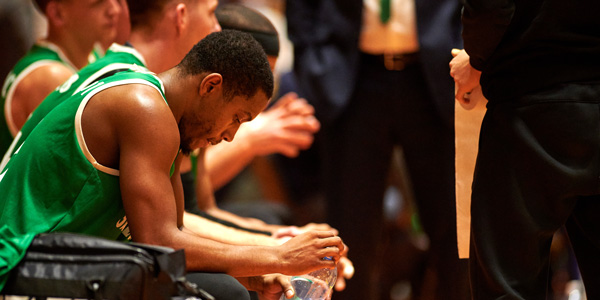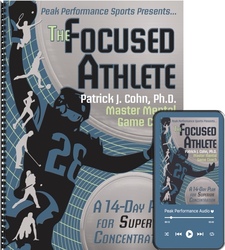
Staying Mentally Tough When Facing Adversity
Most athletes pay no attention to purposefully training their minds. Instead, these athletes leave their mental response to chance.
You want to consistently train your brain by sending yourself positive messages. If you are not actively training your brain, you passively train your brain. That is, whatever messages pop up in your mind, either negative or positive, will affect future performances.
For example, if you haven’t actively trained your brain and a referee or official blows a call, your mental response may be, “This always happens to me. The officials are out to get me. The officials are favoring the other team.”
This negative response will cause you to become frustrated and angry. You will not be able to focus, and you will make more mistakes.
In the same situation, you can train your brain to respond with mental toughness, “No matter what the official does, It doesn’t matter. I can handle anything.”
If you keep sending yourself consistent empowering messages, you will respond with mental toughness automatically.
The Mental Toll of Adversity
The best way to train your brain to handle adversity is to learn to cope with adverse conditions in practice and respond positively. In other words, respond the way you want to react in competitions.
You never want to leave your mental game to chance. You control how you respond in adversity by anticipating challenges and being ready to respond.
If you want to play hard when you are tired in competitions, you can train your brain by pushing yourself hard at the end of practice and sending yourself strong messages:
“I will outwork everyone at the end of practice. I will work hard until the very last second. Nothing can stop me.” The key is to train your brain actively.
Training your Mind to Cope with Adversity
You can learn to cope with adversity by imagining scenarios you might see during a game and how you will cope with it, such as going into the game cold on short notice.
Visualization is not always about rehearsing yourself perform at your peak!
Start by thinking about what might be challenging for you during a game. An interception? Missing a tackle? Harsh weather conditions?
Next, how will you cope with each situation so that you can perform your best despite the challenge?
Related Sports Psychology Articles
- Managing Your Emotions When Adversity Hits
- How to Overcome Adversity for Athletes
- How Adversity Can Improve Mental Toughness
*Subscribe to The Sports Psychology Podcast on iTunes
*Subscribe to The Sports Psychology Podcast on Spotify
*Subscribe to The Sports Psychology Podcast on YouTube
The Focused Athlete

It’s probably no secret that you have many opportunities to become distracted in sports. Athletes are bombarded with both internal and external distractions everyday in practice and competition. Focused athletes are able to get the most from their skills because they are more efficient with practice and more concentrated in competition. Athletes who lack focus let distractions run wild through their mind and don’t know how to adjust or refocus.
The Focused Athlete was developed for any level coach, parent, or junior to professional athlete who wants to improve performance and gain a competitive edge. It does not matter if you are a fledgling junior athlete; or a seasoned professional, plagued with distractions; or you just wanting to learn how to improve concentration…
“The Focused Athlete” is a complete system to teach you how to focus like a champion and harness the power of a zone focus every time you step on the playing field, court, track, or course in practice and games!

